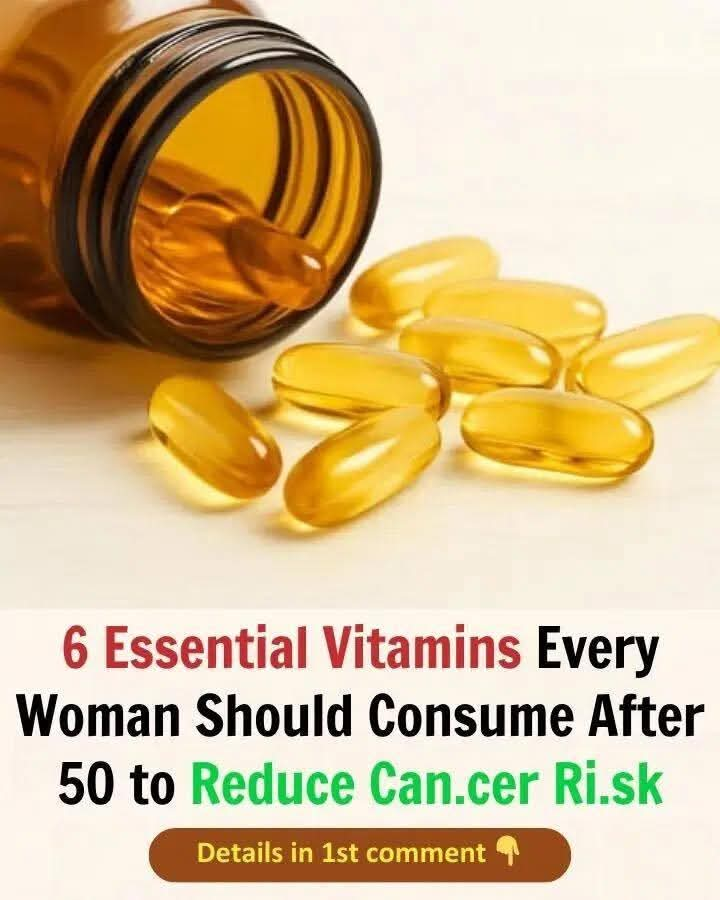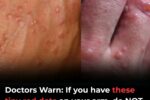6 Essential Vitamins Every Woman Should Consume After 50 to Reduce Cancer Risk

Turning 50 is a major milestone — but it’s also a time when your body needs extra care. As we age, the risk of chronic diseases, including cancer, naturally rises. Fortunately, giving your body the right nutrients can help strengthen your immune system, protect your cells, and lower those risks significantly.
Today, we’ll uncover 6 powerful vitamins every woman over 50 should focus on to help reduce cancer risk and maintain overall health.
1. Vitamin D
Vitamin D is often called the “sunshine vitamin,” but many women are still deficient, especially after 50. Low Vitamin D levels have been linked to several cancers, including breast and colon cancer.
Sources:
- Sunshine exposure (15–20 minutes a day)
- Fatty fish (salmon, mackerel)
- Fortified dairy products
- Supplements if necessary
Tip: Get your Vitamin D levels tested regularly and consider a supplement if levels are low (consult your doctor first).
2. Vitamin C
Vitamin C is a mighty antioxidant that helps neutralize harmful free radicals. It also supports immune function, aiding your body’s defense against abnormal cell growth.
Sources:
- Citrus fruits (oranges, lemons)
- Bell peppers
- Strawberries
- Broccoli and Brussels sprouts
Tip: Eating raw fruits and vegetables helps preserve Vitamin C content.
3. Vitamin E
Vitamin E works alongside Vitamin C to protect cell membranes from oxidative stress — a key factor in cancer development.
Sources:
- Almonds and sunflower seeds
- Spinach and kale
- Avocado
- Vegetable oils (like wheat germ oil)
Tip: Choose natural sources over synthetic supplements whenever possible for better absorption.
4. Vitamin B12
As women age, absorption of Vitamin B12 becomes more difficult. B12 plays a crucial role in DNA repair and cell health — and deficiencies may increase cancer risk, particularly colon cancer.
Sources:
- Eggs and dairy
- Meat and poultry
- Fortified cereals
Tip: If you’re vegan or vegetarian, talk to your doctor about B12 supplements or injections.
5. Folate (Vitamin B9)
Folate, a type of B vitamin, is essential for healthy cell division and DNA synthesis. Low levels are associated with an increased risk of several types of cancer, including breast and colon cancer.
Sources:
- Leafy greens (spinach, kale)
- Legumes (beans, lentils)
- Citrus fruits
Tip: Be cautious with synthetic folic acid supplements — natural food sources are often a safer choice unless prescribed.
6. Vitamin A
Vitamin A supports immune health, vision, and cellular communication. It’s particularly important for regulating the growth of cells and tissues, potentially lowering cancer risk.
Sources:
- Carrots and sweet potatoes
- Dark leafy greens
- Liver and dairy products
Tip: Beta-carotene from plant foods is a safer way to boost Vitamin A levels than relying on high-dose supplements.
Final Thoughts
While no vitamin can completely prevent cancer, maintaining strong levels of these 6 essential vitamins can fortify your body’s natural defenses.
Combine a healthy, colorful diet with regular checkups and lifestyle choices like exercise and avoiding smoking for the best protection.
Important: Always consult with your healthcare provider before starting any new supplements, especially after 50.
FAQs
Q: Can I get all these vitamins through food alone?
Yes, but depending on your lifestyle and health condition, supplements may sometimes be necessary.
Q: Is it safe to take high doses of vitamins?
No, taking extremely high doses can be harmful. Always follow recommended daily allowances unless your doctor advises otherwise.
Q: Should I do a blood test before taking supplements?
Absolutely! A simple blood test can help you and your doctor determine exactly what you need.
Q: What’s more important — diet or supplements?
A balanced diet is the best foundation. Supplements should only fill gaps when necessary.






